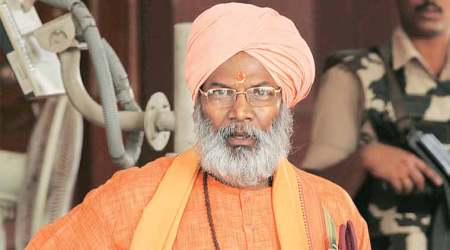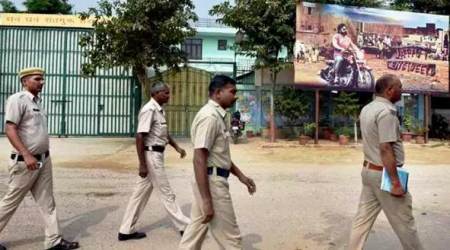 Sohail Hashmi
Sohail Hashmi
It is fitting that concert also means harmony. On Sunday, a citizen’s movement, titled “Nafrat Ke Khilaaf Dilli Ki Awaaz”, a part of the Not In My Name campaign, against hate crimes, will unfold via works of art, from poetry to painting, dance to Dastangoi. Parks, neighbourhoods, community centres, metro trains and platforms, university campuses and workers’ colonies are set to turn into eclectic performance venues. More than 100 performance pieces have been planned from early morning to late evening, making Not In My Name one of the largest single cultural events to take place in Delhi.
Say No to Hatred
Sunday’s initiative continues from a protest at Jantar Mantar in July, in the wake of the lynching of 15-year-old Junaid, who was stabbed to death on a Delhi-Mathura train in June. “The fact is that one protest is not enough to address the climate of hatred that is taking root in our country. Since many of us are artists, our natural language is through performances. We feel that culture can reach people in subliminal ways and bring them together,” says Saba Dewan, who is part of the core committee with fellow filmmakers Rahul Roy and Sanjay Kak.
United We Move
One of the initiatives involves two groups of dancers, who will travel by metro, from the south of Delhi to the north, on the yellow line, and from the east to the west, through the day. “They are going to take 12 hours to make this journey and what we are looking at is about 40 stops, when we come out of the metro station to a park, mall, crossroad, roundabout or a marketplace to perform a dance. We meet at Rajiv Chowk at 1 pm, perform together and then continue our journeys,” says Mandeep Raikhy, a dancer and choreographer. In the piece, performers hold hands, arms interlocked, until “it becomes an interdependent structure that also begins to pull in viewers”.
 Fouzia Dastango
Fouzia Dastango
Big Guns Blazing
Maya Krishna Rao, Rabbi Shergill, Navtej Johar and Madan Gopal Singh are among those who will headline stage shows in Jamia Nagar, and Leisure Valley in Gurgaon. Other addresses are a community hall at Turkman Gate and Madanpur Khadar, where performances include M Syed Sahil Agha’s Dastan Tughlaq Nama, Lokesh Jain’s play on Aamir Khusrau and Askari Naqvi’s Soz Khwaani that recalls the deaths in Karbala.
“When we quote statistics of death, whether in Amarnath or in Delhi, do we feel what death means? What happens in a dead person’s home? What happens to a mother whose child has died? Soz Khwaani or the poems of Karbala, from 1,400 years back, is about personal tragedies,” says Naqvi.
Home Ground
One of the emphasis is on people in small spaces, such as neighbourhoods, expressing their voices. Performances will take place in localities such as Vasant Kunj, RK Puram, Dwarka, Noida and Sheikh Sarai. One of the shows is Fouzia Dastango’s Broadcast, a dramatised and musical rendition of a collection of 28 short stories of Manto, which is directed by Udayan Chakravarty and set to live music by Arman Dehelvi and Shivam Bhardwaj, on instruments ranging from the didgeridoo to temple bells.
At Khirki, which is home to several ethnicities and religions, there is an art session for teenagers and a screening of Garam Hawa, among others. A candlelight vigil on Saturday will lead the way for a kavi sammelan and a mushaira in Mehrauli on Sunday.
 M Syed Sahil Agha
M Syed Sahil Agha
Revisit the Revolt
Sohail Hashmi, one of the best heritage walk leaders in Delhi, will take a group through the history of the first war of Independence on Sunday morning. “One basic thing about 1857 was that it very clearly establishes that, till the mid 19th century, there was no communal divide in the country. For India Against Hate campaign, we thought we would do this walk,” he says. The group will visit sites of the mutiny such as Flagstaff Tower, Ajitgarh, Nicholson Cemetery, Kashmere Gate (which was the last major battle of Delhi) and St James Church.
The Day Before and After History Rewind
The protest will arrive at JJ Colony in Bawana on Saturday. Pankaj Srivastava and Mrityunjay’s poetry and music by Shephali Frost and the band, Folka Dots, are in the roster alongside Dastan Tughlaq Nama by M Syed Sahil Agha. “My piece is about a king who was famous for his orders that appear to have an uncanny similarity with those passed by the current hukumat, from laws on currency to food restrictions, from making an expensive suit to instituting an anti- Romeo squad-like body called Jamaat E Ashikaana. Let us hear these stories, for those who forget history are doomed to repeat it,” says Agha.
 Askari Naqvi
Askari Naqvi
Campus Call
Sunday being a holiday in education institutions, the university chapter of the protest will be held on August 28 at a few Delhi University colleges, Jindal University, Ambedkar University and Ashoka University. The timeline includes talks by students and members of the faculty, poetry readings and songs with the thrust being on spontaneous participation. Banajyotsana Lahiri, who is in charge of the performances in universities, says that student leaders would be present “but no one can come with banners”.
For more information log onto http://www.notinmynameindka.org

